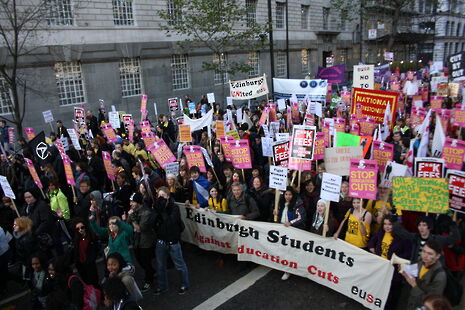Pale, stale, male: age is a more important identity than ever before
In her first column, Yukiko Lui argues that our age is a much-neglected factor in discussions of identity and difference

Is there something inherently different about being young, as opposed to being left-wing, or BME, or trans, or any other label we use to categorise ourselves? Looking back at the car crash that some would call 2016, it would seem so. Last June, young people voted categorically in favour of remaining in the European Union, and the demographic break down of votes cast in the US Presidential election have shown the younger masses voting for Hillary Clinton. It seems that we are, more than ever, living in a world divided – not only along the familiar lines of gender, race, class, or sexuality, but also by age. It is an identity factor we can no longer ignore when considering our politics, both personal and partisan.
This divide is not completely new, however. We’ve used age to delineate borders in art and culture for a long time. In the 1960s, when rock and roll was just appearing on record players around the world, some conservative older folks decried the booming, hip-swinging beats as the devil’s work. Similarly, though the occasional EDM-loving dad bursts with unprecedented success onto the meme scene, you’d probably be hard-pressed to locate a large contingent of middle-aged ravers. This raises other questions, especially regarding the quality and artistic or cultural weight we attach to art made by and for young people – some say modern pop music is vulgar, arrhythmic, a real cultural dumpster fire. Tellingly, it’s mostly older people who recycle these refrains, generation after generation.
“When we look properly, it becomes clear that there is something inherently different about the identities of young people compared to those of middle-aged or older people, whether it was an embarrassing pop punk phase, or a tween obsession with K-pop bands.”
We like to see our identities as constant and resilient things, able to outlast the fickle parts of us. But I think we’ve fed ourselves a small untruth. When we look properly, it becomes clear that there is something inherently different about the identities of young people compared to those of middle-aged or older people, whether it was an embarrassing pop punk phase, or a tween obsession with K-pop bands. The compulsion to lump large swathes of the population into Generations X, Y, and Z is evidence of this. There is undoubtedly a tangible difference in outlook and perspective as you move up and down the age scale.
If age is a legitimate factor in assessing art and culture, then it’s no stretch to say that it might also affect the political leanings of different generations. In the wake of last year’s surprise election outcomes, disparities in age were quickly pointed out as instrumental to understanding the confusion and frustration voiced by younger people all over the world. It was pointed out after the EU referendum, for instance, that if the 16-17 age group could have voted, the outcome would have swung the other way.
Does this mean that we should lower the voting age to include younger people? Or that we should enforce an upper age limit on voting for those who won’t be around to bear the full brunt of their decisions? Regardless of what the ‘right’ answer to the referendum was, we’re still faced with the problem of an ostensible democratic deficit and a lack of representation. I hesitate to advocate for any drastic measures, but the recognition of the crucial factor age plays in political identity means we definitely need to reconsider how we conceptualise politics. We need to warn our politicians against falling into the trap of forgetting their responsibilities to the only true silent majority that exists: the electorates and populations of the future. Sometimes, compromise in politics must involve deferring to the judgement of those in the future whose shoulders will actually be supporting the weight of our decisions.
This view of the world necessarily presumes a narrative of difference rather than unity. Barring the discovery of a fountain of youth, it says that there will always be an irreconcilable difference between the young and the old. Coming to terms with the inescapability of large scale social divergence, quite honestly, makes me nervous. The inevitable nature of the disparity makes its existence scarier than the existences of other ideological differences. But as the steady march of time is unavoidable, so is the fact that we live in a society which is as potentially fractious as it is harmonious. But if we recognise that age is a legitimate and significant contributing factor in diversity of opinion, maybe we can better understand the roots of our disagreements, and do better at coming up with solutions which more faithfully represent the adults of tomorrow.
 Interviews / ‘People just walk away’: the sense of exclusion felt by foundation year students19 April 2024
Interviews / ‘People just walk away’: the sense of exclusion felt by foundation year students19 April 2024 News / Copycat don caught again19 April 2024
News / Copycat don caught again19 April 2024 News / AMES Faculty accused of ‘toxicity’ as dropout and transfer rates remain high 19 April 2024
News / AMES Faculty accused of ‘toxicity’ as dropout and transfer rates remain high 19 April 2024 Theatre / The closest Cambridge comes to a Drama degree 19 April 2024
Theatre / The closest Cambridge comes to a Drama degree 19 April 2024 News / Acting vice-chancellor paid £234,000 for nine month stint19 April 2024
News / Acting vice-chancellor paid £234,000 for nine month stint19 April 2024





